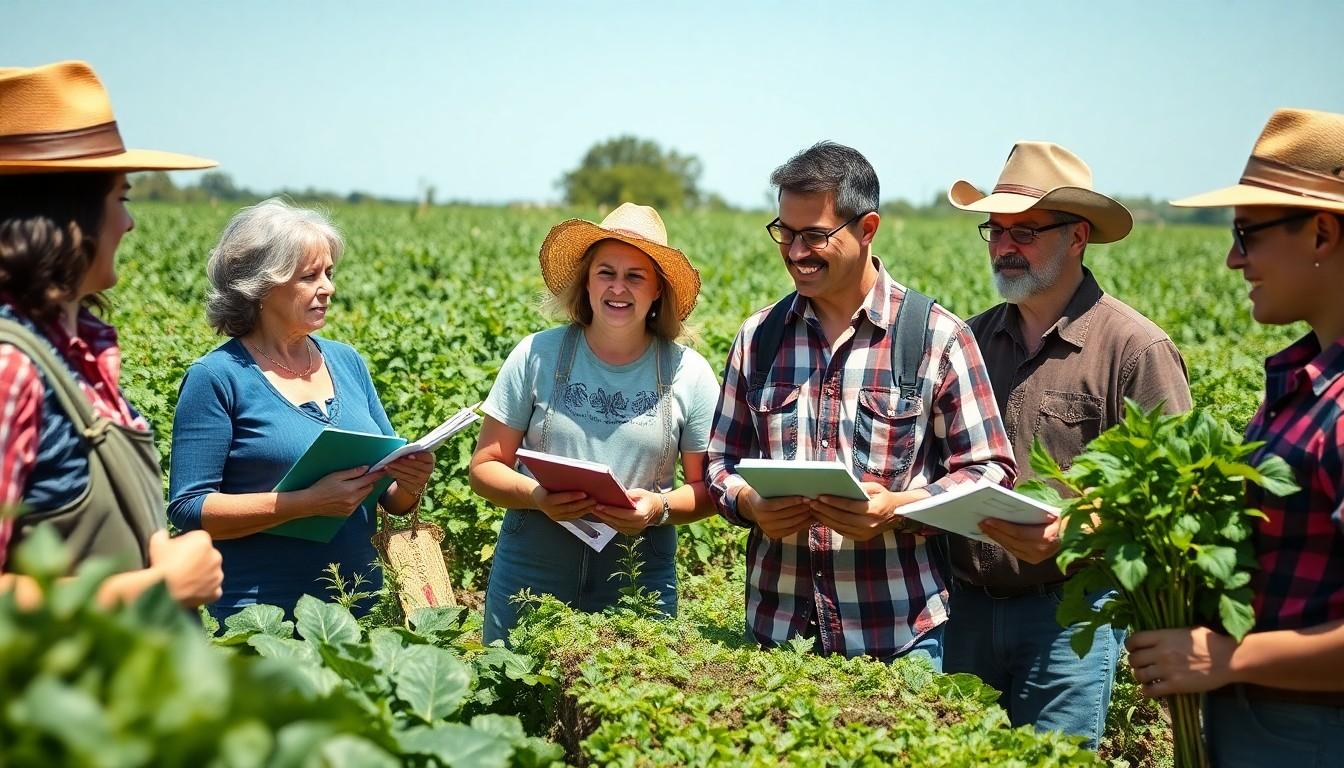In the lush landscapes of the Northeast, where farm-to-table isn’t just a trend but a way of life, the Northeast Organic Farming Association (NOFA) stands as a beacon for sustainable agriculture. Imagine a community where farmers swap secrets like grandmas trading cookie recipes, all while nurturing the earth and growing delicious, organic produce. It’s a place where the soil is as rich as the stories told over a hearty meal.
NOFA isn’t just about farming; it’s about fostering a vibrant network of passionate individuals dedicated to organic practices. Whether you’re a seasoned farmer or a curious foodie, this association offers a treasure trove of resources, workshops, and support. So grab your pitchfork and join the movement—because who wouldn’t want to dig into a future where food is grown with love, care, and a sprinkle of humor?
Northeast Organic Farming Association
The Northeast Organic Farming Association (NOFA) plays an essential role in fostering sustainable agricultural practices across the region. This organization supports a vibrant community dedicated to organic farming and education.
History and Mission
NOFA’s origins trace back to the late 1970s, when a group of farmers sought to promote organic agriculture. Their mission focuses on advocating for a more ecological food system. Promoting education, community engagement, and resource sharing stands at the heart of NOFA’s efforts. The association seeks to empower farmers and consumers, emphasizing their connection to the land and each other. By offering workshops, technical assistance, and advocacy, NOFA ensures that sustainable practices thrive in the Northeast.
Organizational Structure
NOFA operates through a collaborative model that combines local chapters with regional coordination. Each state has its own chapter, allowing for tailored programs that meet specific community needs. An administrative team leads the organization, overseeing strategic initiatives and collaboration opportunities. Member participation remains crucial, as farmers and food advocates contribute to decision-making processes. Through this inclusive structure, NOFA maintains its commitment to supporting organic agriculture while adapting to the evolving demands of the farming community.
Key Initiatives and Programs

Northeast Organic Farming Association (NOFA) runs several key initiatives and programs promoting organic farming and sustainability across the region.
Member Support and Resources
Members gain access to various resources tailored to their needs. NOFA offers educational workshops on organic practices, soil health, and pest management. Networking opportunities exist through regional events, allowing members to connect and share experiences. Resources also include access to technical assistance and guidance on certification processes, which simplifies navigating the organic landscape. Regular newsletters inform members about upcoming events, funding opportunities, and agricultural trends, keeping them engaged and informed.
Advocacy Efforts
Advocacy plays a crucial role in NOFA’s mission. Members participate in efforts to influence agricultural policies that support organic farming. Public campaigns aim to raise awareness about the benefits of organic agriculture and sustainable practices. NOFA collaborates with policymakers to promote fair regulations and funding for organic initiatives. Through grassroots activism, the organization encourages community involvement in the legislative process, empowering farmers and consumers to advocate for healthier food systems.
Success Stories and Impact
The Northeast Organic Farming Association (NOFA) has inspired many through its commitment to organic farming and community collaboration. Numerous farmers and communities have harnessed its resources to create lasting impacts.
Case Studies of Local Farmers
One notable case involves a farm in Vermont that transformed its practices with NOFA’s support. This farmer adopted crop rotation techniques, leading to a 30% increase in yield over two seasons. Another success comes from a Massachusetts dairy farm that shifted to organic practices, resulting in higher milk prices and improved soil health. Community members frequently share their journeys, showcasing how NOFA’s workshops foster innovative solutions. They often cite increased pest resilience, reduced chemical use, and enhanced biodiversity as key outcomes.
Community Engagement
Community events organized by NOFA play a significant role in building connections. Hundreds attend the annual summer conference, where farmers share best practices and learn from experts. Workshops cover topics like organic certification, market access, and sustainable farming techniques. Local chapters engage residents through CSA programs, strengthening community ties and ensuring access to fresh produce. Many find inspiration in the stories shared, encouraging new farmers to join the movement. These engagements create a supportive network that nurtures personal growth alongside agricultural advancements.
Challenges Faced by the Association
The Northeast Organic Farming Association encounters various challenges in its mission to promote sustainable agriculture. Key issues arise in funding and resources, followed by significant regulatory hurdles.
Funding and Resources
Limited funding poses a challenge for NOFA’s initiatives and programs. Grants and donations are vital for educational workshops and community outreach. Without sufficient financial support, the association struggles to maintain its services. Competition for grants often leads to uncertainty in resource allocation. Developing member contributions can partially alleviate these shortages. Future growth depends on enhancing fundraising efforts and attracting new donors to support the vision of sustainable agriculture.
Regulatory Hurdles
Navigating complex regulations creates obstacles for NOFA and its members. Compliance with federal and state policies is often time-consuming and confusing. Organic certification processes require substantial documentation and rigorous inspections. These requirements can discourage new farmers from pursuing organic practices. Advocacy efforts focus on simplifying regulations to promote accessibility. Engaging in policy discussions may help streamline procedures and create an environment more favorable for organic farmers.
Future Directions for the Northeast Organic Farming Association
The Northeast Organic Farming Association (NOFA) looks toward a sustainable and vibrant future. This vision focuses on expanding its influence and outreach within the community.
Strategic Goals
NOFA sets specific strategic goals to enhance organic farming practices across the Northeast. It aims to improve educational access for members by increasing the number and variety of workshops, allowing farmers to learn innovative techniques. Developing partnerships with local organizations is a priority, ensuring a collaborative approach to sustainability. Engaging in legislative advocacy represents another critical goal, as members seek to influence policies that support organic agriculture. Prioritizing resource availability for farmers contributes to empowering them in their quest for sustainable practices. By focusing on these goals, NOFA fosters a robust network that strengthens community ties and promotes organic farming.
Expanding Membership
Expanding membership proves vital for NOFA’s growth and impact. Attracting new members increases resources and diversity in perspectives within the organization. Outreach initiatives play a key role in inviting farmers and food enthusiasts to join this flourishing community. Offering incentives such as discounted workshop fees encourages participation. Enhancing online presence through social media platforms further engages potential members, increasing awareness about NOFA’s mission and activities. Community events designed for networking foster connections among farmers, reinforcing the support system for all members. With these strategies, NOFA works diligently to build a larger, more informed community committed to organic farming.
Commitment to Education
The Northeast Organic Farming Association stands as a vital force in the movement towards sustainable agriculture. Through its commitment to education and community engagement, it empowers farmers and consumers alike. By fostering knowledge sharing and collaboration, NOFA cultivates a network that inspires innovation and resilience in organic farming practices.
As it navigates challenges like funding and regulatory hurdles, NOFA remains dedicated to expanding its reach and influence. The future of organic agriculture in the Northeast hinges on the collective efforts of its members and supporters. By uniting under the banner of sustainability, they can continue to transform the landscape of farming while nurturing the environment and community.

